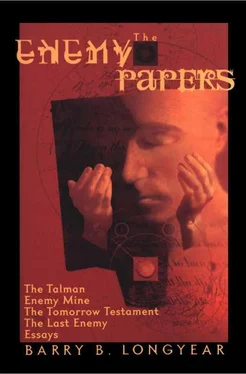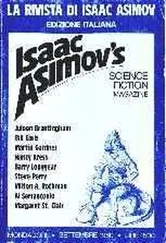Ebneh bent over and hissed into the student’s ear. "And is that light a god?"
"I do not know. When you say god, what do you mean?"
"God! God is God! Are you stupid?"
"A timely question, Ebneh. Quite timely."
Ebneh grabbed Shizumaat’s shoulder with one hand and pointed at Aakva with the other. "Is that the Parent of All?"
Shizumaat’s shoulders slumped and it slowly shook its head. "I do not know."
"What does your back tell you, Shizumaat?"
"My back tells me many things, Ebneh. It tells me that you are displeased with me; it tells me that live meat whipped with sufficient enthusiasm will split and bleed; it tells me that the process is painful." Shizumaat looked up at Ebneh. "It does not tell me that Aakva is a god; it does not tell me that the laws of the servants are sacred truths."
Ebneh pointed at the two rod-carrying servants. "Lay into this one until its back does speak to it of Aakva!"
One of the servants dropped its rod, turned, and walked into the temple. The other studied Shizumaat for a moment, and then handed its rod to Ebneh. "Shizumaat’s back has learned all that a rod can teach it. Perhaps, Ebneh, you can think of a more persuasive argument." Then the second servant turned and went into the temple.
Ebneh stared after the departing servant, then threw away the rod and looked down at Shizumaat. "Why do you defy Aakva? Why do you defy me?"
"I do not defy either, Ebneh. I only tell the truth that I see. Would you prefer that I lie to you? Would that somehow serve your truth?"
Ebneh shook its head. "You will shame your parent."
Shizumaat bowed its head until Ebneh turned and stormed off into the temple. Then Shizumaat looked up at me. "Namndas, help me to your room. I cannot make it by myself."
I pulled the student to its feet. "Do you not want me to take you to your own home?"
Shizumaat laughed, although the effort pained it. "A beating in defense of my truth is one thing, Namndas. I am not up to my parent beating me because I was beaten. That seems a little overdone."
Shizumaat closed its eyes and slumped into my arms. I lifted it and carried the student from the temple to my room off the square.
When Shizumaat recovered, it again took its place on the Madah Wall with its class. I was surprised to see it there, yet even more surprised to see myself still charge-of-class. The only thing that changed was that Ebneh no longer took the recitations of the new students. The servant called Varrah took its place. Varrah heard Shizumaat’s recitation as well as its individual discourse on the Laws of Aakva and the meaning of the Story of Uhe.
The beating it had taken had not changed the words of Shizumaat’s discourse by as much as a single grunt. Varrah, though, made no comment. Instead it listened, took the recitations of the other students, and then complimented me on the brilliance of my charges and the energy of their thinking.
The terror of not knowing the safe path, it haunted me. My life, my future, was at stake. If by some lapse of the gods I should manage to graduate to the center of the temple, I would at least have food and a place to sleep when the years caught me. If the servants should cast me off, though, I might as well be hawking sand in the Madah. It was as though I could see the future, though. My charge Shizumaat would somehow put me between the servants and itself, and I could no longer keep myself clear. All I knew for certain, though, was that my heart would not allow Shizumaat ever again to be beaten.
The days passed, and Shizumaat continued to ask questions and come to conclusions that delighted Varrah and horrified me as well as the rest of my charges. Varrah, though, encouraged Shizumaat to think and question, and soon all of us were thinking and speaking in new ways about new things. Once I told my charge that I believed that someday it would eventually change even the name the servants used to address the God of the Day Light.
"Varrah is the key, Namndas, not I," Shizumaat answered. "Questions, new ideas, different ways of thinking, these come naturally. Varrah allows them to happen by not forbidding them."
It was different, going to the Madah Wall, excited about what we would learn each morning, delighted to be part of Uhe’s Temple, and eager to explore the future. Before the winter rains came, Varrah heard all of our recitations and moved our class off the Madah Wall and within the first row of columns. Varrah kept me as charge of the promoted class, even though I was still a student.
The one lesson that hovered above me, though, waiting for the least-expected moment to inflict itself, was that everything changes. What is up will be down, what is light will be dark, what is happy will be sad, what is good will be found out and destroyed. Before the lesson, though, we investigated, challenged, and learned. As always, Shizumaat was our leader.
Now that our class was in the second rectangle, Varrah told us that we must take what we had learned and apply it to the world outside the temple. "Learn what is, challenge it, and seek to improve or replace with something better."
Some of the students were sent to the Denvedah to learn war. Some of the students were sent to the farms to learn growing. Some of the students were sent to the artisans, markets, and moneylenders to learn the ways of making, buying, and selling. Shizumaat and I were sent to the last of the nomads to learn the ways of the hunt.
I complained to Shizumaat that we had drawn the assignment with the least opportunity. After all, the days of the nomads were over. The world was growing crops and livestock, and trading in markets for things manufactured by the artisans. Nomads created nothing, learned nothing, and made no knowledge upon which greater knowledge could be built. That was, I concluded, what kept the old tribes the same for thousands of years until Uhe shattered the world’s ways of doing things.
Shizumaat said to me, "Namndas, every person, place, and thing can teach us, if we have the wit to learn." And with that, we went to Shizumaat’s aged parent. Caduah was pleased that Varrah had advanced Shizumaat with its class, and that the servant had such a high opinion of its child. We bid Caduah good-bye and struck out for the land of the Kuvedah where the last of the nomadic tribes still followed the darghat.
When we climbed the step trail up the southern wall of the Great Cut ten days later, we stood upon the northernmost edge of the great plain of the Kudah. It was as flat as a griddle stone, thick with waist-high grasses, and dotted at great intervals by massive menosa trees. Shizumaat and I aimed our steps toward the south, stopping nights beneath the protection of the trees.
In the dark, while I prepared a meal for us, Shizumaat would go out to study Aakva’s children spread out above us on the blanket of night. On one such night, Shizumaat came back to the camp, took a brand from the fire, and said to me, "Namndas, I am going to walk toward the north with this flame. When the light from this brand seems the same size as the lights from Aakva’s children, lift two brands above your head and wave them. Call my name, too."
"What are you trying to see?" I asked.
My fellow student only smiled and said, "Let me see it, first, then I will tell you what I saw."
Shizumaat left, holding the burning stick above its head, and began walking toward the north. I studied the light, and did not let its flame leave my sight for more than an eyeblink. After one of those eyeblinks, though, I could not again pick out the flame from Aakva’s Children low on the horizon. I lifted the brands, waved them, and called out Shizumaat’s name. When it returned to the fire it brought with it a most fantastic, fascinating, and blasphemous idea.
"Think of this, Namndas. If Aakva is a great fire circling our universe, and if Aakva’s Children are still more fires but at great distances, is it not possible that they circle other universes? And those other universes, might they not contain their own living beings?" Shizumaat looked up at the night sky. "For these answers I would suffer much. To meet those beings, see them, touch their thoughts, I would exchange my life."
Читать дальше











